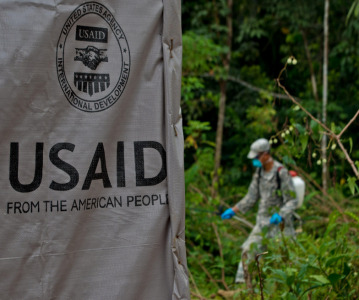Who are BioNTech?

CPHI lifts the lid on the relatively little known German biotech and partner of Pfizer behind the most promising COVID19 vaccine candidate
BioNTech was founded in 2008 in Mainz, Germany, by husband and wife, Uğur Şahin, and Özlem Türeci, – both German scientists of Turkish origin-- and Austrian oncologist Christoph Huber, with a vision to develop pioneering therapeutics for cancer and other serious diseases.
In terms of R&D, the clinical-stage company’s key breakthrough came in August 2018, when it announced it had agreed a multi-year collaboration with Pfizer to develop mRNA-based vaccines for the prevention of influenza. Under this agreement, Pfizer was to assume sole responsibility for further clinical development and commercialization of the vaccines after BioNTech’s completion of a first in human clinical study.
In September 2019, BioNTech announced it had secured an initial investment of USD55 million via the Bill & Melinda Gates Foundation to develop HIV and tuberculosis programs, further expanding the company’s infectious disease portfolio. A further USD45 million under the collaboration could be realised through potential future grant funding.
But it was not until 2020 that the company really started grabbing the headlines as its mRNA-based work began to pay off. In March, it signed a letter of intent with Pfizer to co-develop and distribute BioNTech’s potential COVID-19 vaccine, BNT162, globally. That deal excluded China where BioNTech had already partnered with Fosun Pharma to develop the vaccine.
Development of the vaccine quickly gathered pace, with approval to conduct Phase I/I trials gained in April, and first participants dosed in the US in May. And in June, the European Investment Bank agreed to provide EUR 100 million of debt financing to support the development of the vaccine programme, allowing BioNTech to expand its manufacturing capacity in order to supply the vaccine globally.
This was dwarfed in September when the German Federal Ministry of Education and Research awarded a grant of up to EUR 375 million to BioNTech to support accelerated development of SARS-CoV-2 vaccines. That same month, BioNTech announced it had agreed to buy Novartis’ manufacturing facility in Marburg, Germany with a view to expanding its COVID-19 vaccine production capacity by up to 750 million doses per year, once fully operational.
With the announcement in November that preliminary data indicates BNT162b2 is more than 90% effective in preventing COVID-19 in participants without evidence of prior SARS-CoV-2 infection – and several large BNT162 distribution deals already signed with major countries including the US, Japan, the UK and most recently the European Union -- BioNTech now seems set to become a household name.
Related News
-
News US FDA adds haemodialysis bloodlines to devices shortage list
On March 14, 2025, the US FDA published an open letter to healthcare providers citing continuing supply disruptions of haemodialysis bloodlines, an essential component of dialysis machines. -
News Women in Pharma: Manufacturing personal and team success
Our monthly Women in Pharma series highlights the influential lives and works of impactful women working across the pharmaceutical industry, and how the industry can work towards making the healthcare industry and workplace more equitable and inclusive... -
News Pfizer may shift production back to US under Trump pharma tariffs
At the 45th TD Cowen annual healthcare conference in Boston, USA, Pfizer CEO Albert Bourla outlined the potential for Pfizer to shift its overseas drug manufacturing back to the US as pharmaceutical industry players weigh their options against Presiden... -
News Experimental drug for managing aortic valve stenosis shows promise
The new small molecule drug ataciguat is garnering attention for its potential to manage aortic valve stenosis, which may prevent the need for surgery and significantly improve patient experience. -
News Women in Pharma: Connecting accessible pharma packaging to patients – a Pharmapack Special
Throughout our Women in Pharma series, we aim to highlight how CPHI events encourage discussions around diversity, equity, and inclusion initiatives in the pharmaceutical industry. -
News Vertex Pharmaceuticals stock jumps as FDA approves non-opioid painkiller
UK-based Vertex Pharmaceuticals saw their stock shares soar as the US FDA signed off on the non-opioid painkiller Journavx, also known as suzetrigine, for patients with moderate to severe acute pain, caused by surgery, accidents, or injuries. -
News Trump administration halts global supply of HIV, malaria, tuberculosis drugs
In various memos circulated to the United States Agency for International Development (USAID), the Trump administration has demanded contractors and partners to immediately stop work in supplying lifesaving drugs for HIV, malaria, and tuberculosis to c... -
News 2024 Drug Approvals: a lexicon of notable drugs and clinical trials
50 drugs received FDA approval in 2024. The centre for biologics evaluation and research also identified six new Orphan drug approvals as under Biologics License Applications (BLAs). The following list picks out key approvals from the list, and highlig...
Recently Visited
Position your company at the heart of the global Pharma industry with a CPHI Online membership
-
Your products and solutions visible to thousands of visitors within the largest Pharma marketplace
-
Generate high-quality, engaged leads for your business, all year round
-
Promote your business as the industry’s thought-leader by hosting your reports, brochures and videos within your profile
-
Your company’s profile boosted at all participating CPHI events
-
An easy-to-use platform with a detailed dashboard showing your leads and performance







